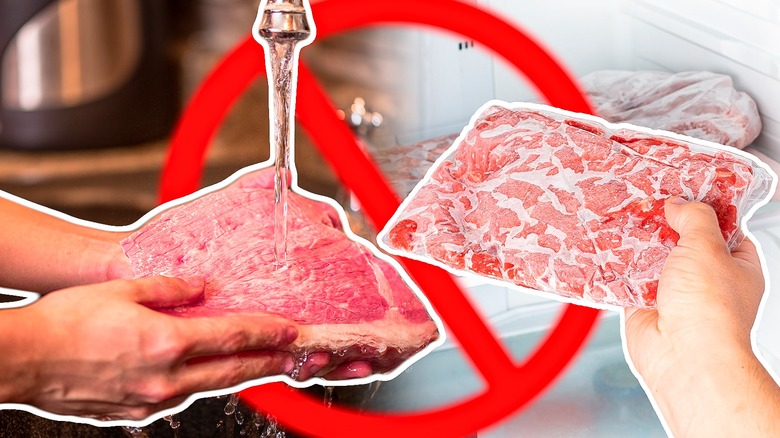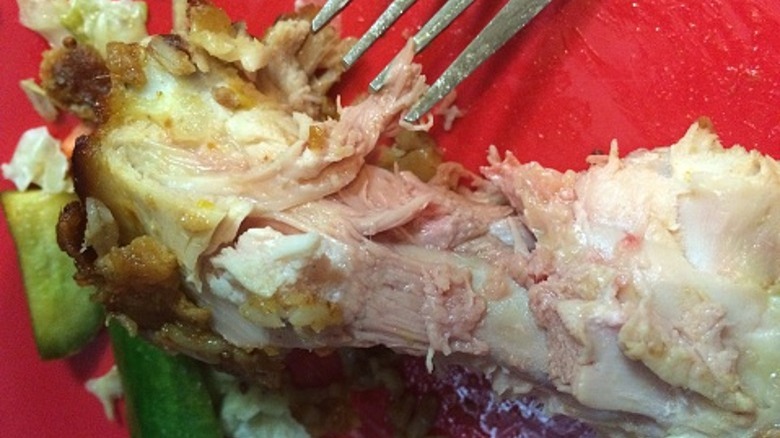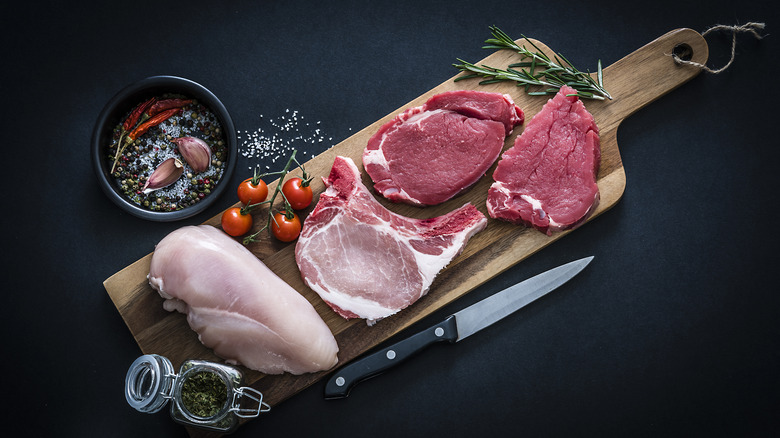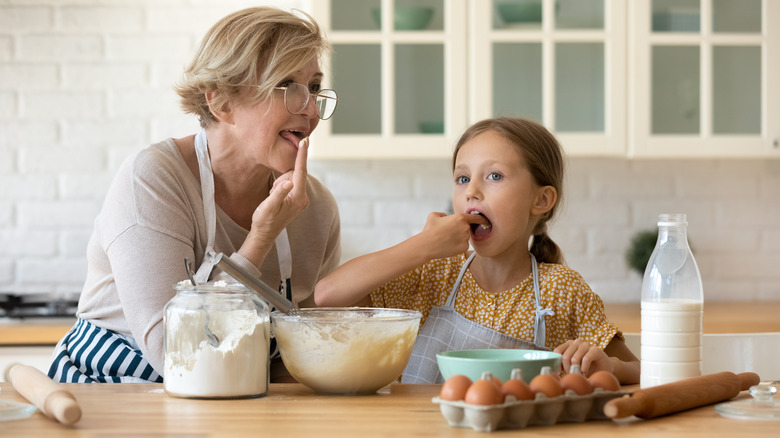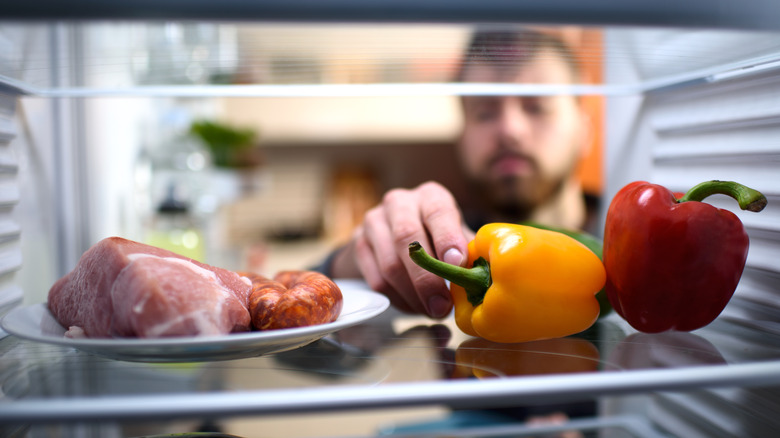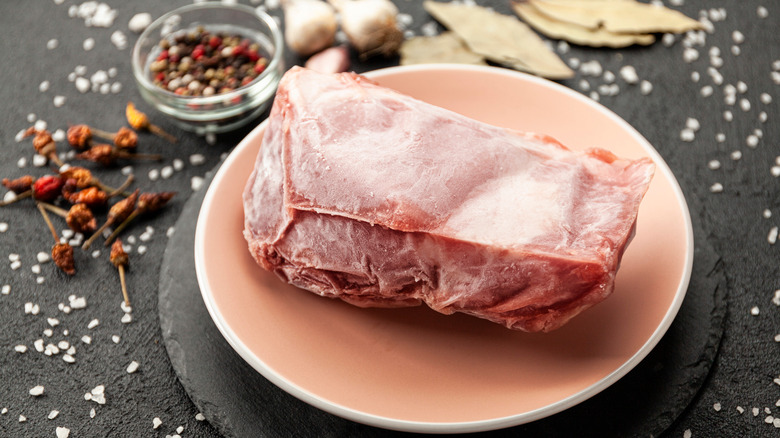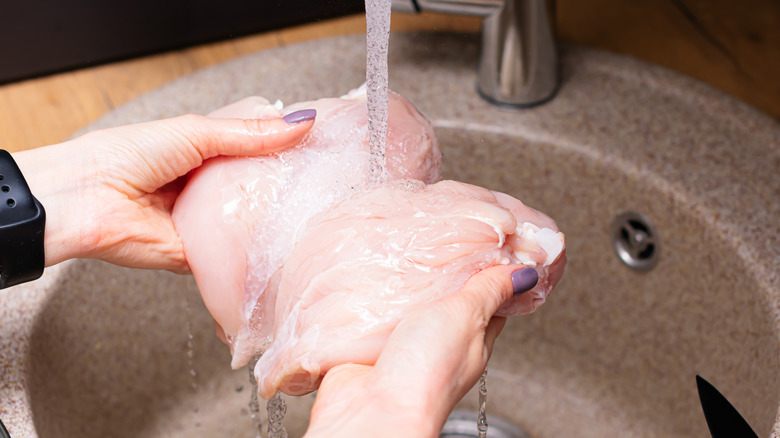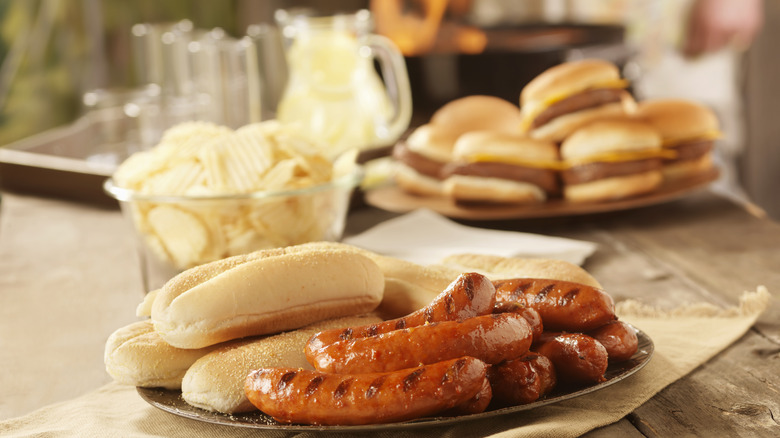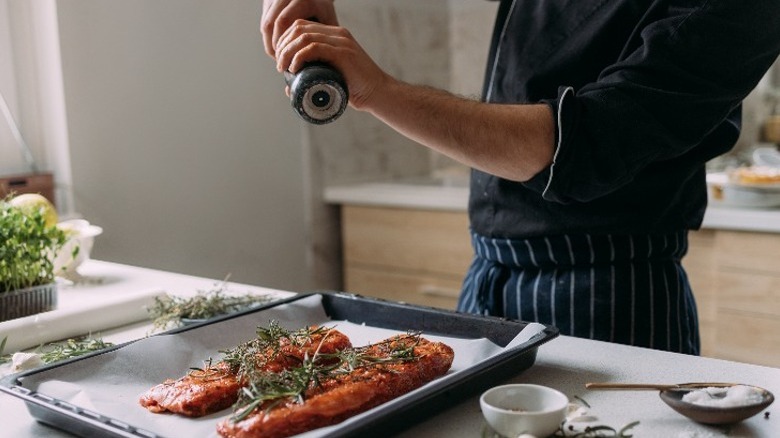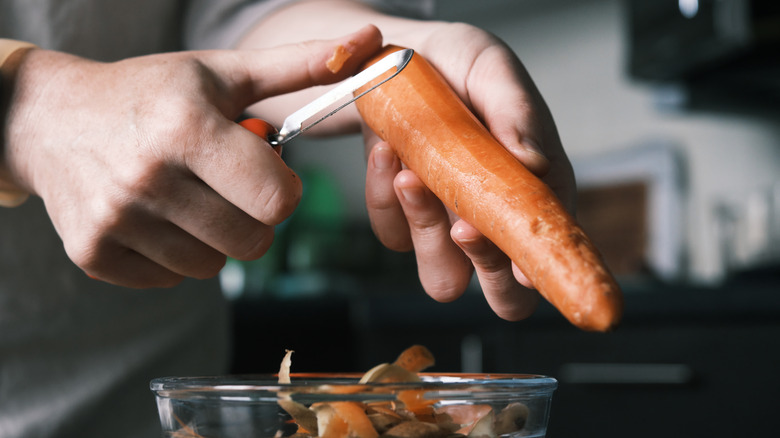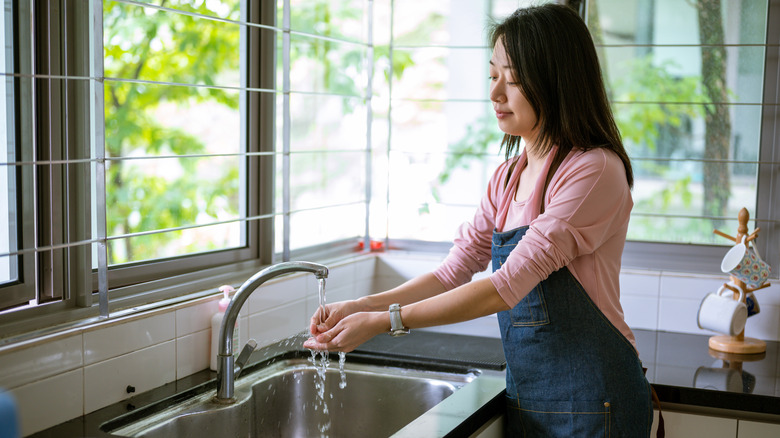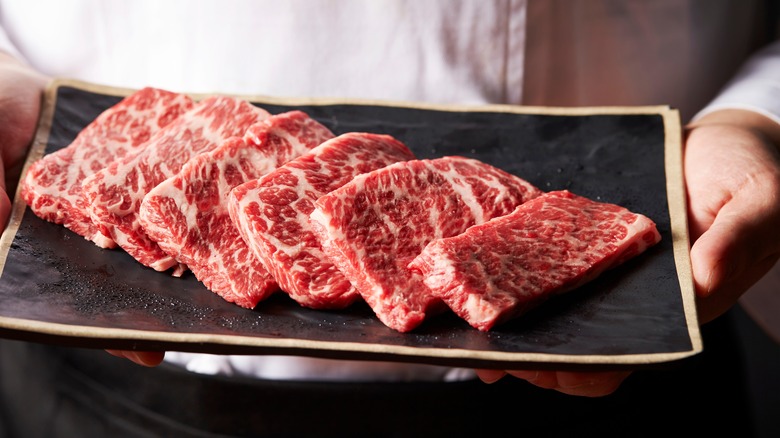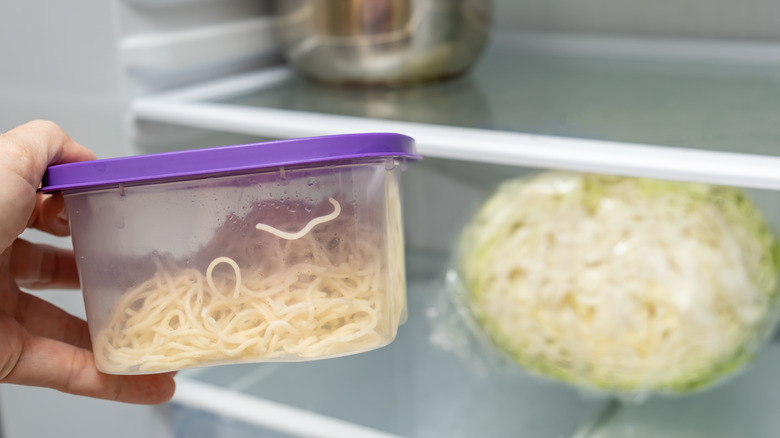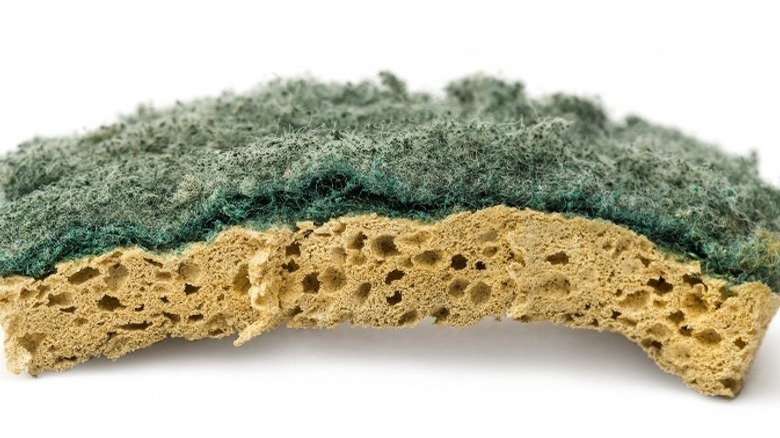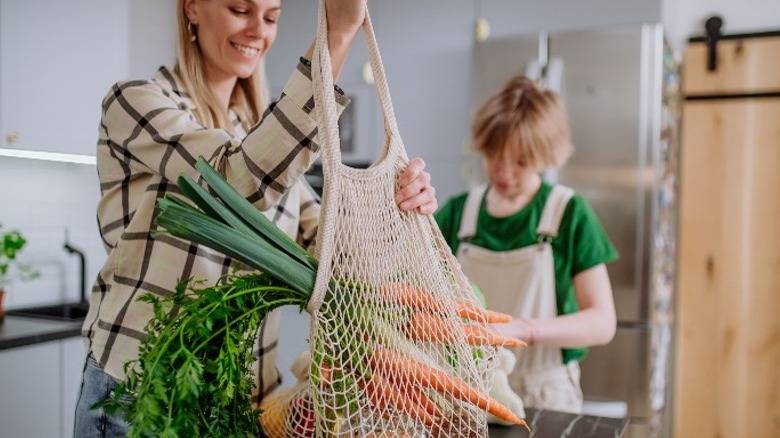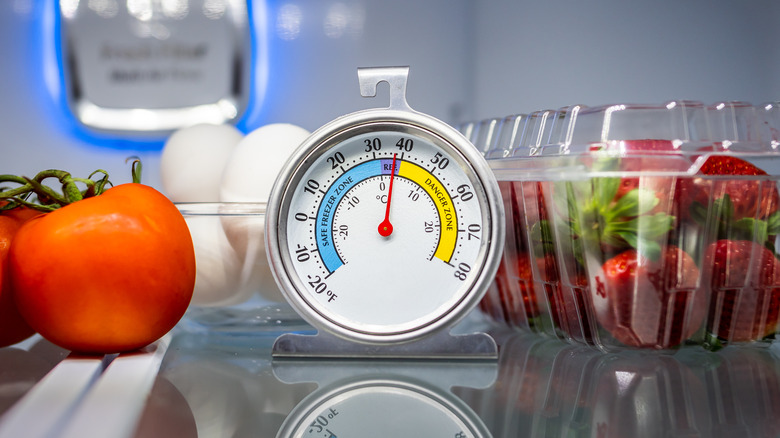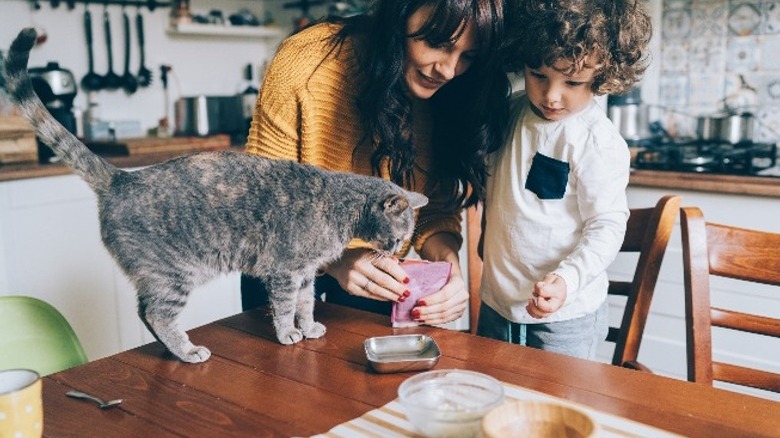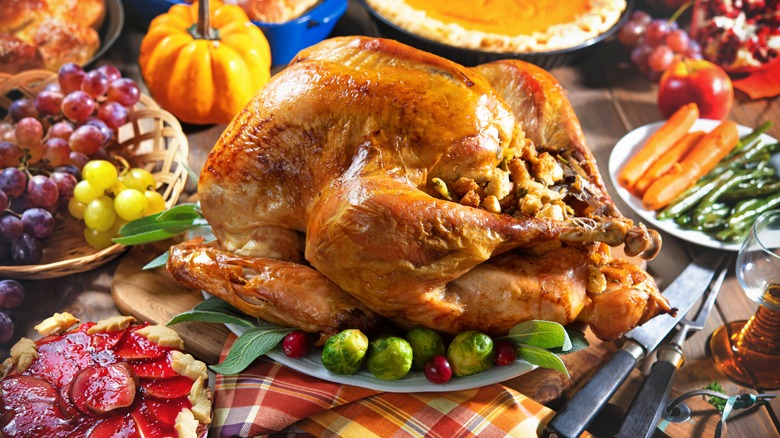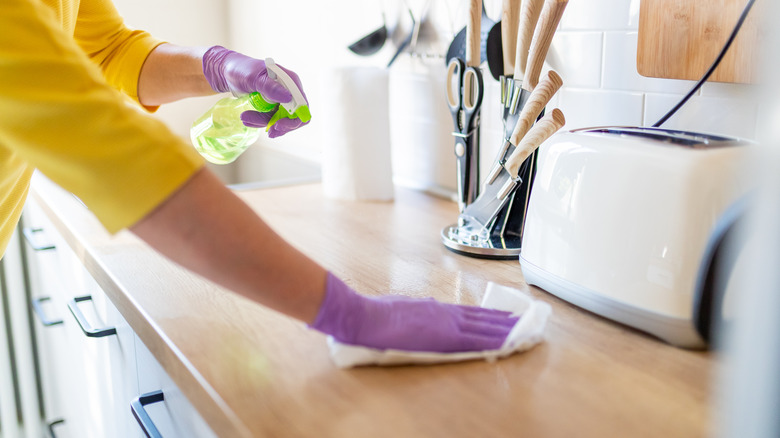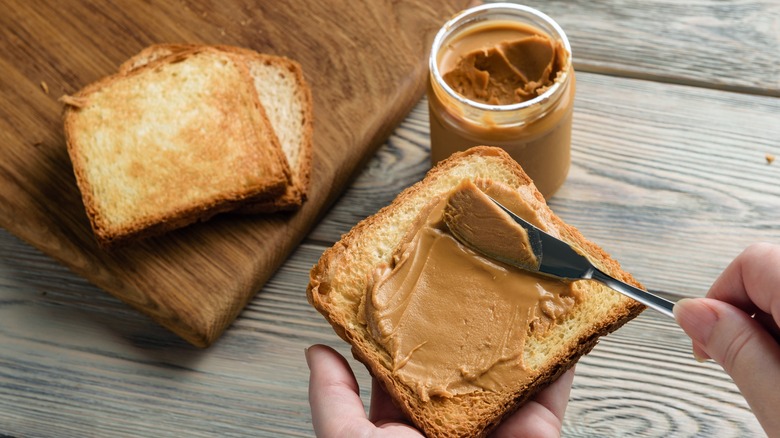20 Food Safety Mistakes That Could Be Dangerous
Keeping food safety in mind is always important. When appropriate precautions aren't taken, food can become contaminated with viruses, bacteria, and more. According to the World Health Organization, food safety is a major concern. Not only is it responsible for causing 200 different types of diseases, but it can also lead to malnutrition, particularly for more vulnerable populations.
Are you being unsafe with how you're handling, cooking, or storing food? Are you putting yourself or others at risk of foodborne illnesses, such as salmonella, listeria, and more? Even if you think that you take food safety very seriously, you may still be making some of the most common food safety mistakes. Learning to identify — and then correct — these mistakes is essential. Doing so can help you avert potentially serious health side effects for yourself and those that you care about.
1. Undercooking meat, seafood, poultry, or eggs
Not cooking meat, poultry, seafood, or eggs long enough is one of the biggest food safety mistakes you can make. Salmonella, E. coli, listeria, and other bacteria are present in raw meat. If these foods aren't cooked to their safe and appropriate internal temperatures, the bacteria will still be present. This can lead to food poisoning.
Once these items are fully cooked, however, the bacteria are killed and no longer pose a threat. To verify that meat is fully cooked, you should always use a meat thermometer instead of judging based on the color of the meat. When you try to eyeball it, you could end up serving meat that has not yet reached a safe internal temperature. For example, chicken must reach an internal temperature of 165 degrees Fahrenheit and fish must be a minimum of 145 degrees Fahrenheit before they are considered cooked and safe to consume, according to the Centers for Disease Control and Prevention.
2. Not using a separate cutting board for raw meats
As you'll soon realize, many food safety mistakes are related to cooking or working with raw meat. Another thing you need to avoid is using the same cutting boards for raw meat that you use for cutting vegetables, slicing bread, and other food prep tasks in the kitchen.
Having separate cutting boards reduces the chances that the bacteria from the raw meat will transfer to other foods and make you sick. To help you remember which cutting board is for which type of food, you can buy a colored cutting board. Designate it as the raw meat-only board and still take care to thoroughly clean it with hot water and soap each time it is used.
3. Tasting raw batter or cookie dough
Depending on how old you are, you may have fond memories of taking fingerfuls of raw cookie dough or cake batter as a child. You may even still be sneaking a quick taste when you're in the middle of baking. However, doing so is not a safe choice.
Salmonella or E. coli bacteria may be present in raw eggs and certain types of flour. If you take a taste of the batter — even just a small one — you could get food poisoning. Instead, always wait to taste baked goods until they are fully cooked. If you're really craving some cookie dough, you can find cookie dough made without raw eggs at the grocery store.
4. Not properly storing raw meat in the fridge
Here's another raw meat mistake that many people don't realize they're making. Did you know that there is a right place and a wrong place to store raw meat in your refrigerator? You should always store raw meat (as well as raw fish and raw poultry) on the bottom shelf of the fridge.
Doing so helps limit the chances of cross-contamination from the juices dripping onto other items in the fridge. In addition to always placing raw meat on the bottom shelf, it is also important to make sure it is stored in a sealed container as an added protection against the juices leaking out of the packaging.
5. Leaving meat out on the counter to thaw
Have you heard of the "Danger Zone?" It refers to the temperature range of 40 to 140 degrees Fahrenheit. When the temperature of meat falls within this range, conditions are ideal for bacteria to multiply very quickly, increasing the chances of contracting foodborne illness when the meat is eaten.
Many people don't realize that thawing meat on the counter can result in portions of the meat thawing more quickly than others, putting them in this danger zone. The best way to thaw meat is by putting it in the refrigerator the night before you plan to use it. If you need to thaw it more quickly, you can also place it in cold — not hot — water. Just be sure to cook meat or poultry that is thawed using this method promptly.
6. Washing raw meat
Were you taught to wash meat and poultry in the sink before cooking them? If so, you'll want to start unlearning this unsafe habit. Washing poultry or meat in your sink can actually make it more likely for you or someone in your home to suffer from a foodborne illness.
This is because the bacteria that are all over the raw meat will spread to your sink or counters, making it more likely for cross-contamination to occur. Fortunately, washing meat is not necessary. Several years ago, people were catching and preparing their own animals, so they did require this type of prep work. However, today, meats are cleaned during the production process, eliminating the need for the consumer to wash them again at home.
7. Letting foods sit out for too long
Leaving food out on the counter for too long is another mistake that has the potential to make you or others sick. Remember the Danger Zone, or the temperature range between 40 and 140 degrees Fahrenheit, where conditions are prime for bacteria growth? Well, this Danger Zone applies to more than just raw meat.
When other food items are left out at temperatures within this range, E. coli, salmonella, and other dangerous bacteria can grow rapidly. Always refrigerate foods within two hours of sitting out at room temperature, according to the United States Department of Agriculture. Items should be refrigerated within one hour if temperatures surpass 90 degrees Fahrenheit — remember this part for your next summer picnic.
8. Handling seasonings and raw meat at the same time
Cross-contamination is a common cause of food poisoning. Here is another potential cross-contamination mistake that you'll want to avoid: holding salt, pepper, and other spice containers with your hands that haven't been washed since handling raw meat.
It's so easy to overlook washing your hands when you're in the middle of preparing meat to go in the oven. You just need to add some of your favorite seasonings, then it will be ready to go, and you can wash your hands before moving on to preparing the rest of the meal. However, failing to wash your hands before seasoning the meat means that you're transferring the potentially harmful bacteria to your spice jars, where they can later contaminate your hands or those of anyone else using them.
9. Neglecting to wash fruits and vegetables before peeling them
When you peel oranges, avocados, potatoes, and other fruits and vegetables, do you wash them first? Many people assume that since you're removing the peel, it isn't necessary to wash these produce items. After all, any dirt or bacteria should remain on the peel and end up in the trash can, right? Unfortunately, this is not accurate.
If there are any germs or bacteria on the fruit or vegetable's skin, they'll just transfer to your fingers, knife, or vegetable peeler. Once they've moved to these surfaces, they can continue to spread through cross-contamination, threatening the health of everyone in the home.
10. Not washing your hands when necessary
Frequent hand-washing is so important when working in the kitchen. If you don't wash your hands after handling raw meat, dirty produce, or other food items that could be contaminated with bacteria, you're running the risk of cross-contamination that could result in a foodborne illness.
Similarly, neglecting to wash your hands after using the bathroom, sneezing or blowing your nose, touching the trash can, taking care of a sick individual, or touching pet food can also increase the chances that you can make yourself or someone else sick. Make it a habit to wash your hands as soon as you enter the kitchen to start cooking or preparing food. Then, wash them again anytime you handle raw meat or come into contact with anything else that should not touch the food you're preparing.
11. Using the same plates or utensils for raw and cooked food items
Here is yet another example of how cross-contamination can make you or someone else sick. Think about the last time you cooked burgers on the grill, sautéed chicken on your stovetop, or cooked ground beef to make spaghetti sauce. Did you use the same utensils to serve the cooked items that touched them when they were still raw? Just because the meat was fully cooked when you served it, it doesn't mean that there aren't traces of the raw meat and bacteria on the spoon or spatula.
These bacteria could be transferred back to your cooked food, contaminating it and increasing the risk of illness. Always grab a clean spoon or serving utensil once food items have finished cooking. The same goes for plates and serving platters. If you bring your raw hamburgers out to the grill on one plate, always place them on a separate plate once they're cooked.
12. Eating leftovers that are more than four days old
You shouldn't eat leftovers that have been in the fridge for more than four days, according to the USDA. After this time, the growth of bacteria or toxins in the food can reach a level that is too high and may result in food poisoning.
Come up with a system that works for you to help prioritize which foods to eat before they go bad. If you cook a meal and have more leftovers than you think you'll be able to eat, consider freezing them. Leftovers can last for up to four months in the freezer. The belief that you can smell foods to determine whether they are still safe to eat or not is inaccurate. Even if your food smells normal, it still may be unsafe to eat.
13. Not cleaning or replacing your kitchen sponge frequently enough
The dirtiest item in your home may be found in your kitchen, not the bathroom, as you may guess. Because they remain moist and contact so many different types of food and surfaces, sponges pick up a lot of different bacteria. If they aren't cleaned, then these bacteria can multiply rapidly.
According to Consumer Reports, the U.S. Food and Drug Administration even prohibits restaurants from using sponges to clean any surfaces that come into contact with food. If you want to keep using your sponge, instead of switching to an easier-to-wash dishcloth or kitchen brush, be sure to clean it daily. You can microwave a wet sponge for a minute or run it through the dishwasher to clean it. Just remember to always squeeze water out of the sponge so that it will dry. You should replace your sponge every few weeks or any time you notice an odor.
14. Not washing reusable shopping bags frequently
Switching to reusable shopping bags instead of paper or plastic bags is an eco-friendly choice. However, did you know that reusable bags can pose a food safety risk? Each time you go to the grocery store, your reusable bags are likely filled with different items.
One week one of the bags may hold meat, while the next it could be filled with bread or produce items. If meat juices drip into the bag (or dirt from various produce items falls into the bottom), they could contaminate the next food item placed in the bag. Fortunately, you don't have to throw out your reusable bags and return to paper or plastic. You should, however, regularly wash your reusable bags in the washing machine or with dish soap and warm water. To add an extra step of protection, bag raw meat separately in a plastic bag at the grocery store.
15. Assuming that your refrigerator is cold enough
Is your refrigerator cold enough to keep perishable foods from spoiling too quickly? Refrigerators should be kept no warmer than 40 degrees Fahrenheit, though closer to 37 degrees Fahrenheit is even better, according to the FDA. Even if your refrigerator has a thermostat, it may be inaccurate and give you a false sense of security.
The best thing to do is spend a few dollars to purchase an appliance thermometer. This way you can check the actual temperature of the fridge and ensure that your foods are safe. Don't forget to check the temperature inside your freezer too — it should be no warmer than 0 degrees Fahrenheit. Once you've verified that your refrigerator and freezer are set to safe levels, keep the thermometer handy so that you can use it every few months to check the temperatures again.
16. Letting pets jump up on tables or countertops
If you have cats (or even dogs) who like getting up on your countertops or tables, now is the time to break this habit and train them to stay off. Each time a pet jumps up on a kitchen countertop or table, they're bringing dirt and bacteria with them — just think about what's stuck on their paws.
This dirt or bacteria is then contaminating these surfaces, which are used for serving or preparing food. With cats in particular, their paws likely have traces of feces or urine from the litter box. Cat feces can also carry toxoplasmosis, a disease that is dangerous for humans, particularly pregnant women, according to Spalding Labs.
17. Not taking extra precautions if cooking stuffing inside a turkey
The safest way to cook stuffing is in a separate baking dish, not stuffed inside a turkey. When you cook stuffing inside a turkey, it often doesn't cook as quickly as the meat on the bird. So, when you remove the turkey from the oven, the stuffing may not have reached a high enough internal temperature for bacteria and pathogens to be killed.
If you decide you still want to cook stuffing inside a turkey, do not take it out of the oven until the internal temperature of the stuffing has also reached 165 degrees Fahrenheit. It is also safest to stuff the bird right before you're ready to bake it, not several hours ahead of time.
18. Not properly cleaning your kitchen countertops and sink
There is a right way and a wrong way to clean your kitchen countertops and sinks. Unfortunately, if you've been cleaning them the wrong way, you're putting yourself and others at risk. Bacteria, such as listeria, can remain on these surfaces for nearly a week (up to six days). If you don't properly clean your sinks and countertops, you won't kill the bacteria, and it will still be present to contaminate the foods you're preparing.
Simply wiping your counters down with a damp sponge or towel is not enough to kill the bacteria. You must sanitize the surfaces. To do this, start by washing them using hot and soapy water. Then, follow the directions on the disinfectant spray bottle to sanitize the surface (the length of time the disinfectant needs to sit can vary between products). After waiting the required amount of time and wiping the counters and sink down, finish up by rinsing the surface with plain water.
19. Being careless if someone in your home has food allergies
Food allergies are very real. If anyone in your home is allergic to peanuts, tree nuts, specific fruits, or any other foods, it is essential that you take these allergies seriously. An allergic reaction has the potential to be life-threatening, so you want to do everything you can to minimize the chance that someone will consume even trace amounts of something they're allergic to.
To protect your loved ones, make sure that you thoroughly clean any pots, pans, or kitchen tools that will come into contact with their food. Depending on the severity of the allergy, you may want to have a set of cookware and tools that will only be used when preparing meals for the person with that particular allergy. Always cook their allergen-free version of the meal first and remove it from the kitchen before moving on. Frequent hand washing when handling allergens is another important step.
20. Not being extra cautious if you're pregnant or have a compromised immune system
It is important for everyone to take food safety seriously. However, if you're pregnant or have a compromised immune system, it is even more important for you to take extra precautions to avoid food poisoning.
For example, according to the CDC, pregnant women are 10 times more likely to become infected with listeria than other members of the population. The risk of infection is even higher for pregnant Hispanic women. If you're pregnant, you should stay away from soft cheese, unpasteurized milk, and certain types of seafood. Eating these items can increase the chances of a listeria infection.
